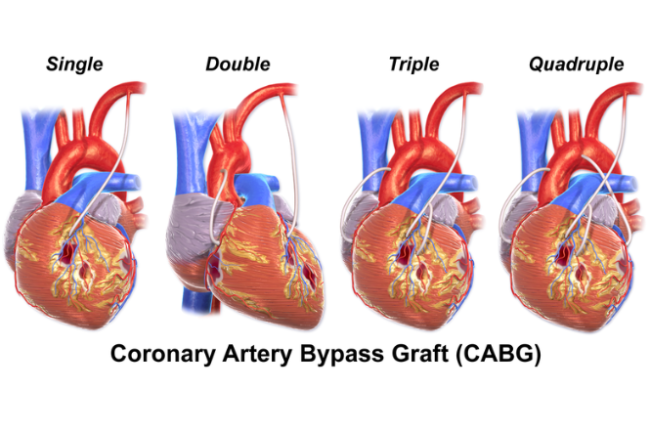You can now add Healthify as a preferred source on Google. Click here to see us when you search Google.
Coronary artery bypass graft surgery | Pokanga ia manawa
Commonly known as 'bypass surgery'
Key points about coronary artery bypass surgery
- A coronary artery bypass graft (CABG or pokanga ia manawa) is a surgical procedure used to improve blood flow and oxygen supply to your heart muscle.
- The bypass creates a new route for blood to travel around narrowed or clogged parts of your heart's major arteries.
- The surgery will be done by a specialist heart doctor (heart surgeon) in hospital under general anaesthetic.

Your heart, like all organs, needs a constant supply of blood to provide it with oxygen and nutrients. Two arteries, called the left and right coronary arteries, supply the blood.
Over time, arteries can clog up due to the build-up of fatty deposits called plaques. This process is known as atherosclerosis. When this happens to your coronary arteries, it is known as coronary artery disease.
Bypass surgery involves removing a blood vessel from some other part of your body and using it to create a detour or bypass around the clogged artery leading to your heart muscle. This allows blood to reach your heart muscle again.
If you have coronary artery disease, you are at high risk of complications like heart attack and angina and your doctor may recommend you have coronary artery bypass surgery. The surgery doesn't fix heart disease, but it can help control symptoms (eg, chest pain or shortness of breath) and lower your risk of heart problems. Even with surgery you need to make and maintain changes to your lifestyle – especially those factors that caused the arteries to clog up in the first place. This includes not smoking, getting to a healthy weight and eating a healthy diet. Read more about how to lower your risk of heart disease.
Coronary bypass surgery involves removing a blood vessel from another part of your body (usually your chest, arm or leg) and attaching or grafting it to the coronary artery above and below the narrowed area. This creates a detour or bypass around the blocked artery leading to your heart.
The new blood vessel is known as a graft. It is quite normal to need 2, 3 or 4 grafts, otherwise known as a double, triple or quadruple bypass, although more can be done.
Image credit: blausen.com via Wikimedia Commons
Watch a video(external link)(external link) on how the procedure is done.
The surgery will be done by a specialist heart doctor called a heart surgeon in hospital under general anaesthetic. While your heart is being operated on, it's usual for it to be temporarily stopped. During this time, the flow of blood to your heart and lungs is kept going through a heart-lung bypass machine. The machine takes over your heart’s job of pumping and your lungs’ job of breathing. Alternatively, some surgeons perform off-pump bypass surgery, where they operate without using the bypass machine.
The operation takes between 3 and 6 hours.
This surgery is regularly done with great success and many people can remain symptom free for 10–15 years after their surgery. However complications can occur during or after the operation. These include:
- bleeding
- an irregular heart rhythm
- wound infection
- memory or concentration problems – which often resolves in 6–12 months
- kidney problems
- stroke
- heart attack.
Before your surgery you will need:
- Tests including an ECG (electrocardiogram) and blood tests.
- To quit smoking if you are a smoker.
- To organise support at home when you are recovering.
- To take time off work to recover.
- To make a plan for keeping your heart healthy.
The cardiology service will let you know what you need to do to prepare for the procedure. This includes when to stop eating and drinking before surgery, and what medicines to take.
In hospital
Due to the anaesthetic, you may feel a little disorientated and will be quite sleepy when you wake up from the surgery. You will be closely monitored in a specialist ward in the Intensive Care Unit (ICU) after your surgery. Once you are feeling better, you will be moved to another ward where a healthcare team will continue to monitor you. They will give you pain relief as required. A physiotherapist will help you with exercises to help you recover.
You will need to stay in hospital for about 5–7 days after having a coronary artery bypass graft surgery.
Recovery takes time and everyone recovers at slightly different speeds. Generally, you should be able to sit in a chair after 1 day, walk after 3 days, and walk up and down stairs after 5 or 6 days.
Your nurse will advise you about how to care for your healing wounds before you go home. Your healthcare team will let you know when you need a follow-up appointment.
At home
When you leave hospital someone will have to drive you home and be there to look after you for 7–10 days. You must not go home alone.
Most people make a full recovery within 12 weeks. Plan for a recovery of 2–3 months. You may feel well enough to return to work 6 weeks after the operation. In this recovery time remember to look after your mental health as this sort of operation can affect you emotionally as well as physically.
If you usually drive, you won't be able to for at least 4 weeks after your surgery. Your healthcare team will let you know when you can start driving again.
Long-term
As well as keeping in touch with your GP, your healthcare team may suggest cardiac rehabilitation for you. Cardiac rehabilitation programmes offer you and your whānau information on a variety of ways to keep your heart healthy, and support you in your recovery (getting your strength back) after your surgery. Programmes are available in most centres – search for a cardiac rehabilitation programme(external link) and read more about cardiac rehabilitation.
Note that the surgery doesn't cure heart disease, so if you don't make any lifestyle changes, other arteries and your new grafts can become clogged. This will put you at high risk of a heart attack and other heart problems and may mean you need more surgery over time. So you still need to do everything you can to improve your heart health. This includes:
- avoiding or drinking less alcohol
- eating healthier foods
- not smoking or using tobacco products
- controlling stress
- staying active.
Heart help(external link)(external link) Heart Foundation, NZ, cardiac rehabilitation programmes
Quit smoking(external link)(external link) Quitline NZ, 0800 778 778
The following links provide further information about coronary artery bypass surgery. Be aware that websites from other countries may have information that differs from New Zealand recommendations.
Coronary artery bypass graft surgery(external link) Heart Foundation, NZ
Get in shape for surgery – 5 ways to have the best chance of recovery(external link) British Heart Foundation, UK
Heart-healthy eating(external link) Heart Foundation, NZ
Personal stories about coronary bypass(external link) Heart Foundation, NZ
Brochures
A guide to coronary artery bypass graft surgery(external link) Heart Foundation, NZ, 2020
References
- Coronary bypass surgery(external link) Mayo Clinic, US, 2020
- Coronary artery bypass graft (CABG)(external link) NHS, UK, 2021
- Coronary artery bypass surgery(external link) British Heart Foundation, UK, 2022
- Heart treatments and proccedures(external link) Health New Zealand | Te Whatu Ora, NZ
Credits: Healthify editorial team. Healthify is brought to you by Health Navigator Charitable Trust.
Reviewed by: Associate Professor Sue Wells, Public Health Physician, University of Auckland
Last reviewed:
Page last updated:





